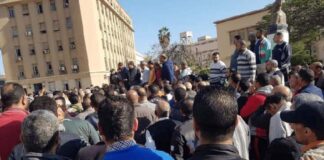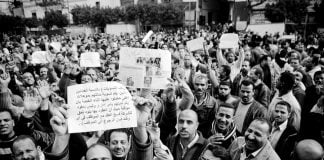Protests took to the streets of Egypt in April despite a ban on demonstrations. The coordination and determination of the mobilisations marks a shift in the confidence of the opposition to the regime.
But they were met by a wave of repression. Soldiers were deployed to the assembly points and around 150 were arrested.
In the run-up to the protests the security forces has already seized people. They included labour lawyer and member of the Revolutionary Socialists Haitham Mohamedain.
He has been detained for investigation on charges of membership of the Muslim Brotherhood, attempting to overthrow the regime and inciting demonstrations.
The immediate cause of the mobilisations is the decision by the government of Abdel Fattah el-Sisi to hand over two disputed Red Sea islands to ally Saudi Arabia.
But there are also wider issues about democracy, workers’ rights and the harshness of everyday life.
Protests
Protests against police brutality, and recent demonstrations over the islands have seen the re-emergence of open resistance.
In March, after police killed a taxi driver in Cairo, thousands of local people marched on the Interior Ministry. Slogans included “All police are thugs” and “Revenge!”
The regime is in crisis. The government is struggling to supply basic goods such as rice, cooking oil and bread. Unemployment is still rising with tourism paralysed. Egypt’s currency has fallen to a record low against the US dollar, leading to the cost of imported goods soaring.
This means price rises for workers and the poor. It also means that raw materials are more expensive for companies, leading to anger against Sisi within elements of the ruling circles.
The regime’s problems have led to speculation in the media of a “palace coup” that could see Sisi replaced by a different “patriotic” figure from the security apparatus.
Some of the left have celebrated such a possibility. The April 6 youth movement called on the army to intervene and withdraw the decision to hand over the two islands.
But in a statement before the protests, the Egyptian Revolutionary Socialists said, “Three years of revolution and counter-revolution have shown the inherent hostility of the military establishment to the revolution.
“The military is the last line of defence of the state, and its most formidable prop. Calling for military intervention is dangerous because it leads the revolutionary masses to lose confidence in themselves.”
It’s crucial that as much solidarity as possible is raised internationally with the new resistance in Egypt.
This includes calling for the release of all those arrested and imprisoned, the investigations of “disappearances” and pressure to bring to justice those who tortured to death student Giulio Regeni.
By Charlie Kimber
Socialist Worker UK





